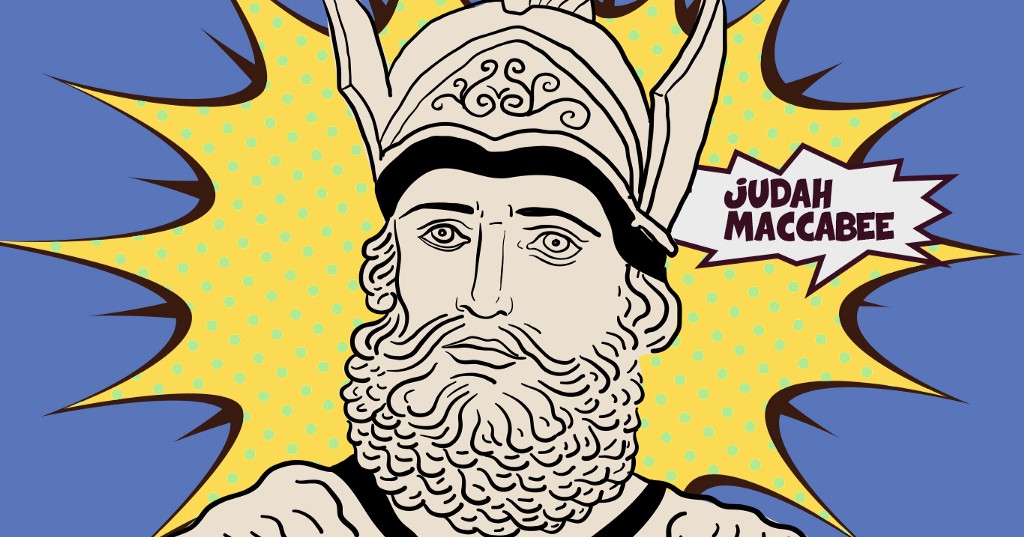This Jewish Warrior Priest Is The Reason Hanukkah Exists

Hanukkah translates to ‘dedication.’ Judah Maccabee taught us its true meaning.
Our Unsung Heroes series brings history’s unknown badasses out of the footnotes and into the spotlight.
When most people think of the Jewish holiday of Hanukkah they think of eating potato latkes and lighting the menorah. But if you delve into the history behind the “Festival of Lights” — or if you ever saw “A Rugrats Chanukah” as a kid — you know there’s a deeper message there: Don’t settle for anything less than you deserve.
I know it sounds like a cookie-cutter message from a 90s romantic comedy, but listen to the incredible story of the warrior-priest Judah Maccabee and you’ll see exactly what I mean.
Two thousand years ago, Israel wasn’t its own country — it was just a province of a Syrian-Greek kingdom known as the Seleucid Empire. For a time, the Seleucids allowed the Jews in the little state of Israel to practice Judaism the way they pleased.
That all changed in the Second Century B.C., when a new king named Antiochus IV took the throne. Antiochus tried to force everyone under his rule to adopt Greek lifestyle and culture and to practice polytheism, which is considered heretical by Jews. Though some Jewish people in Israel had no problem with this and willingly gave up Judaism in order to assimilate, others openly defied the king by continuing to practice their faith.
Angered by the Jews who didn’t obey his orders, Antiochus sent an army of Syrian soldiers to Jerusalem, which was the capital of ancient Israel. When the thuggish soldiers got to Jerusalem, they went on a rampage, destroying holy scrolls, stealing treasures and even killing Jewish people who dared to defy them.
The soldiers also erected a giant statue of Zeus in the Jewish Temple, which was the central place of practice for most of Jerusalem’s inhabitants. (In the Rugrats interpretation, it’s actually a giant Cynthia doll that the soldiers erect.)
In order to really force their point, the Syrian soldiers began forcing the Jewish leaders of Jerusalem to make sacrifices to Zeus, a pagan god. Eventually, an elderly Jewish priest named Mattathias refused, killing a soldier who had tried to force him to make a pagan sacrifice. Mattathias’s sons quickly rushed to his aid, killing a bunch of other Syrian soldiers who were present. Afterwards, to avoid being caught, Mattathias and his sons escaped into the wilderness. From their woodsy hideout, the brave old priest and his sons called on other Jews to rebel against their cruel overlords. Slowly but surely, other Jews heeded the call and an uprising was born.
Mattathias was an old man and unfit physically to lead the rebellion, so his son Judah Maccabee took over. Judah was a priest but quickly proved to be a skilled warrior. He and his men, who were known as the Maccabees, lived in caves to avoid detection and employed guerrilla tactics against their better-trained and better-armed enemy. The Maccabees pioneered the art of the “surprise attack” which they used on Seleucid soldiers in order to instill a permanent feeling of insecurity.
One of Judah’s major victories early on was the Battle of Nahal-el-Haramiah in 167 B.C. There, the greatly outnumbered Maccabees slaughtered a brigade of soldiers led by a powerful Seleucid governor. Judah himself executed the governor, Apollonius, and used Apollonius’s personal sword for the rest of his life to show what would happen to anyone who came up against it.
The victory at Nahal-el-Haramiah helped launch the Maccabees from a fringe guerrilla group to a major force to be reckoned with. A few years later, they succeeded in recapturing the city of Jerusalem from the Seleucids. The first thing the Jews did upon winning Jerusalem was to purify the temple, which had been “besmirched” by their pagan overlords. Remember how the Syrians erected that statue of Zeus? Yeah, that came down real quick.
This purification and reclamation of the Jewish temple in Jerusalem is the reason Jews celebrate Hanukkah today. Here’s why: It’s believed that during the rededication ceremonies, there was only enough oil to keep the temple’s menorah lit for a day. In reality (or so the story goes) the oil lasted for eight days. It was a miracle. And it explains why the menorah today holds nine candles — eight to represent the eight days that it burned after the Temple was retaken, and one to light the others.
It’s also why Jewish people — and Grandpa Boris in the “Rugrats” version — eat foods fried in oil (like latkes and donuts) during Hanukkah.
The word Hanukkah (which can also be spelled “Chanukah”) translates to “dedication.” And it’s thanks in part to Judah Maccabee and his men that the world will forever know its meaning.
